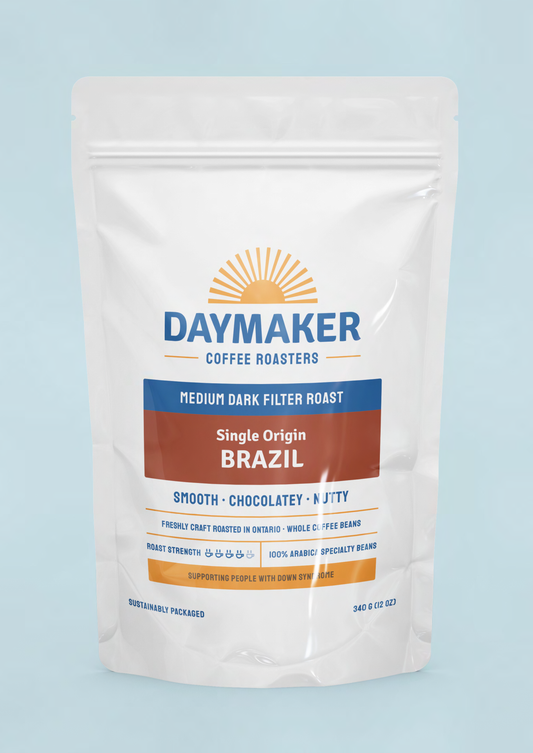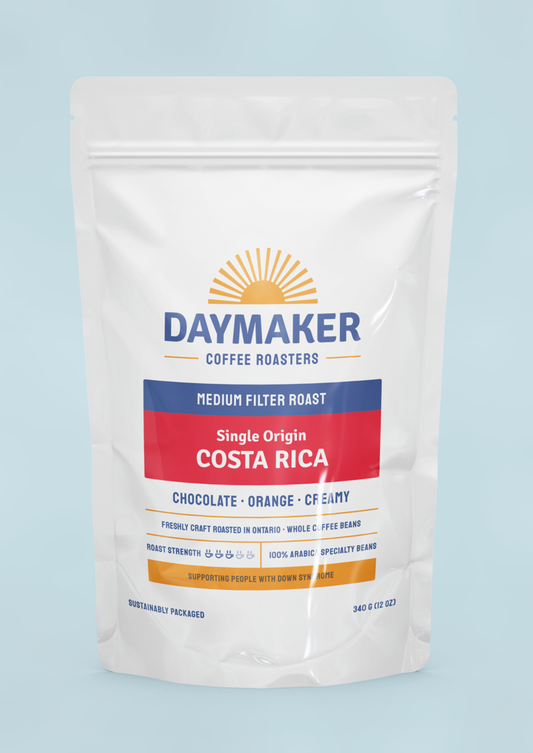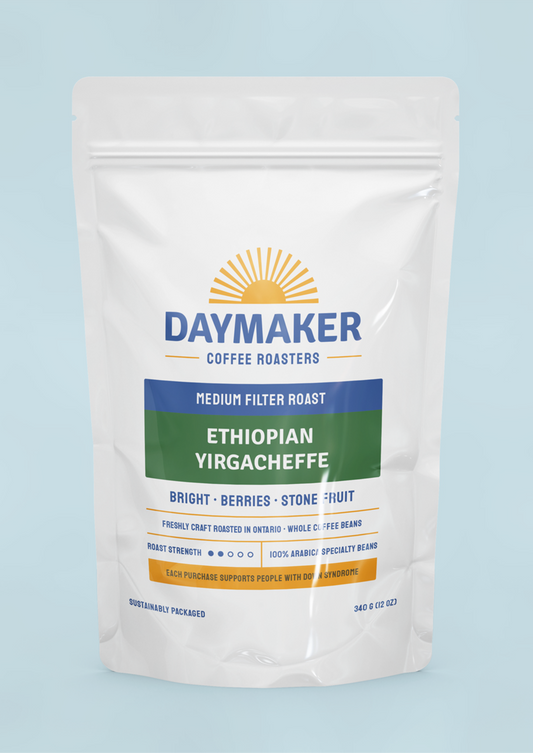Collection: Single Origin Coffee
Explore Daymaker Coffee Roasters' Single Origin Coffee Collection, offering exceptional beans sourced from Brazil, Ethiopia, and Costa Rica. Each coffee is carefully selected to showcase the unique flavours and profiles from these renowned coffee-growing regions. Whether you're a connoisseur or just discovering single origin coffees, our collection promises a rich and diverse tasting experience. Enjoy the finest beans, freshly roasted to perfection.

-
Costa Rica
Regular price From $20.00 CADRegular priceUnit price / per -
Ethiopian Yirgacheffe
Regular price From $19.99 CADRegular priceUnit price / per -
The 6ix Brew
Regular price $15.00 CADRegular priceUnit price / per
The Journey of Single Origin Coffee
Learn more about Single Origin coffee and tips for enjoying it.
Cultivation and Harvesting
The Growth Process of Coffee Plants
Single origin coffee begins its journey on carefully cultivated coffee farms. Coffee plants, primarily of the Arabica species, are meticulously nurtured for several years before they start bearing fruit. These plants thrive best in regions with rich soil and a warm climate, conditions essential for the development of high-quality beans.
Ideal Growing Conditions and Regions
Single origin coffee is often sourced from specific regions known for their unique growing conditions. For instance, Ethiopian coffee is famed for its distinct floral and fruity notes, a result of the high altitudes and fertile soil. Brazilian coffee, on the other hand, benefits from the region's vast and varied climate, producing beans with nutty and chocolatey flavours. Costa Rican coffee is renowned for its bright acidity and complex flavours, thanks to the country's rich volcanic soil and consistent rainfall.
The Coffee Cherry and Its Ripening Process
The coffee cherry, the fruit of the coffee plant, starts as a small green berry. As it ripens, it turns a deep red, indicating that it is ready for harvest. The ripening process is critical; only fully ripened cherries are selected for the best single origin coffee, ensuring optimal flavour and quality. Harvesting is often done by hand, especially in mountainous regions, to ensure that only the best cherries are picked.
Types of Coffee Beans
Arabica
Flavour Profile and Growing Regions
Arabica beans are prized for their smooth, sweet flavour profiles and higher acidity. They are predominantly grown in Latin America, Eastern Africa, Asia, and Arabia. The unique conditions in these regions, such as altitude and climate, contribute significantly to the beans' nuanced flavours, which can range from floral and fruity to nutty and chocolatey.
Characteristics and Growth Conditions
Arabica coffee plants are typically grown at higher elevations, which contribute to their complex flavour profiles. These plants are more delicate and require specific growing conditions, including steady temperatures and adequate rainfall. The beans are oval with a curved crease, and their high sugar content results in a sweeter taste compared to other varieties.
Robusta
Flavour Profile and Growing Regions
Robusta beans have a stronger, more robust flavour, often described as harsher and more bitter. They are predominantly grown in Africa, Indonesia, and Vietnam. Robusta beans are known for their higher caffeine content, which makes them more resistant to pests and diseases.
Characteristics and Growth Conditions
Robusta coffee plants can thrive at lower altitudes and in a variety of climates. The beans are smaller, rounder, and have a straight crease. The higher caffeine content not only contributes to their strong flavour but also enhances their shelf life.
From Cherry to Bean
Processing Methods
Dry Processing
Dry processing, also known as natural processing, involves drying the entire cherry under the sun after it is harvested. This method is traditional and is often used in regions with abundant sunlight. The dried cherries are then hulled to extract the beans. This process tends to impart fruity and complex flavours to the coffee.
Wet Processing
Wet processing, or washed processing, involves removing the cherry's pulp before drying the beans. The beans are fermented to remove the mucilage and then washed with water. This method is preferred for high-quality coffees as it highlights the beans' intrinsic flavours and acidity.
Drying and Roasting
After processing, the beans are dried to reduce their moisture content. This is a crucial step to prevent spoilage. Once dried, the beans are roasted to develop their flavours. Roasting profiles vary, from light roasts that preserve the bean's natural flavours to dark roasts that add deep, bold notes.
Packaging
Proper packaging is essential to maintain the beans' freshness and flavour. Single origin coffee is typically packaged in airtight, opaque bags with one-way valves to allow the release of carbon dioxide while preventing oxygen from entering. This ensures that the coffee retains its optimal quality until it reaches the consumer.
Single Origins: Advantages of Single Origin Coffee
Freshness and Flavour
Single origin coffee offers unparalleled freshness and flavour. Because the beans are sourced from a single region, they retain the distinct characteristics and unique flavour profiles of their origin. The freshness is further preserved by grinding the beans just before brewing, which helps maintain the essential oils and aromatic compounds.
Preservation of Essential Oils and Aromatic Compounds
Whole beans preserve essential oils and aromatic compounds better than pre-ground coffee. When you grind the beans right before brewing, you ensure that these compounds are at their peak, resulting in a richer, more aromatic cup of coffee.
Impact of Grinding on Flavour
Control and Customization
Grinding whole beans allows you to control the grind size, which significantly impacts the brewing process and final flavour.
Coarse Grind for French Press and Cold Brew
A coarse grind is ideal for French press and cold brew methods, as it allows for a slow extraction that prevents over-brewing.
Medium Grind for Drip Coffee Makers
A medium grind works well with drip coffee makers, providing a balanced extraction and flavour.
Fine Grind for Espresso
A fine grind is essential for espresso, as it creates the necessary pressure to extract the concentrated flavours during a relatively fast brewing process.
Variety and Exploration
Single origin coffee offers a wide variety of flavour profiles from different regions. Exploring these can be an exciting journey for coffee enthusiasts, allowing them to appreciate the unique characteristics of beans from Ethiopia, Brazil, Costa Rica, and other regions.
Regional Flavour Profiles
Ethiopian Coffee
Ethiopian coffee is known for its vibrant, fruity, and floral notes. The high altitudes and fertile soil contribute to a complex flavour profile, often with hints of berries, citrus, and jasmine.
Brazilian Coffee
Brazilian coffee typically offers a nutty and chocolatey flavour with a smooth body. The diverse climate and rich soil of Brazil produce beans that are both versatile and robust.
Costa Rican Coffee
Costa Rican coffee is renowned for its bright acidity and rich, complex flavours. The volcanic soil and consistent rainfall in the region contribute to a coffee that often has notes of tropical fruit, caramel, and citrus.
Opportunities for Coffee Enthusiasts
Single origin coffee provides endless opportunities for exploration and appreciation. By trying beans from different regions, enthusiasts can develop a deeper understanding of the nuances and complexities of coffee, enhancing their overall coffee experience.
Why Single Origin Coffee Has Superior Taste
The Role of Freshness in Flavour
Freshness is critical in preserving the complex flavours of single origin coffee. By grinding the beans just before brewing, you ensure that the volatile compounds responsible for flavour and aroma are at their peak.
Timing of Oxidation Process
Oxidation begins as soon as the beans are ground, leading to a rapid loss of flavour. By grinding just before brewing, you minimize this process and preserve the coffee's freshness and taste.
Comparison to Pre-ground Coffee
Pre-ground coffee often loses its flavour quickly due to prolonged exposure to air. Single origin whole beans, when freshly ground, provide a far superior taste experience.
The Science of Oxidation
Chemical Reactions and Flavour Degradation
Oxidation causes the essential oils and aromatic compounds in coffee to degrade, resulting in a stale and flat taste. Minimizing exposure to air by grinding just before brewing helps preserve these delicate flavours.
Minimizing Oxidation for Optimal Taste
Storing beans in airtight containers and grinding just before brewing are key practices to minimize oxidation and maintain the coffee's optimal taste.
Single Origin Coffee vs. Ground Coffee
Freshness and Aroma
Whole bean single origin coffee retains its freshness and aroma far better than pre-ground coffee, ensuring a richer and more flavourful cup.
Flavour Profiles
Single origin coffee offers distinct flavour profiles from specific regions, providing a more nuanced and complex taste experience compared to the blended or pre-ground alternatives.
Customization and Brew Quality
Grinding whole beans allows you to customize the grind size and optimize the brew quality for different brewing methods, ensuring the best possible extraction and flavour.
Exploring Different Beans and Flavours
Single origin coffee encourages exploration and appreciation of the diverse flavours from various coffee-growing regions, enhancing your coffee knowledge and enjoyment.
How to Choose the Best Single Origin Coffee
Identifying Your Flavour Preferences
Sweet and Light vs. Rich and Bold
Understanding your flavour preferences is key to choosing the right single origin coffee. Whether you prefer sweet and light notes or rich and bold flavours, there's a single origin coffee that suits your taste.
Matching Preferences with Daymaker Products
Daymaker Coffee offers a range of single origin coffees to match different flavour preferences. Explore their selection to find the perfect match for your palate.
Matching Coffee to Your Brewing Method
Different brewing methods bring out different characteristics in coffee. Choose the right grind size and brewing method to optimize the flavour of your single origin coffee.
Explore Single-Origin and Blends
Single-Origin Coffees
Characteristics and Benefits
Single origin coffees offer distinct flavours and characteristics from specific regions, providing a unique and authentic coffee experience.
Coffee Blends
Balancing Flavours and Enhancing Complexity
Blended coffees combine beans from different regions to create balanced and complex flavour profiles, offering a different but equally enjoyable coffee experience.
Certifications and Commitments of Daymaker Coffee
Understanding Coffee Certifications
Specialty Grade, Direct Trade, Ethical Sourcing Practices
Daymaker Coffee's certifications ensure that their products meet high standards of quality, sustainability, and ethical practices.
The Importance of Sustainable Practices
Environmental and Social Impact
Sustainable practices are crucial for protecting the environment and supporting the communities involved in coffee production.
Daymaker Coffee’s Quality Assurance
Fresh Roasting, Biodegradable Packaging, and More
Daymaker Coffee is committed to providing fresh, high-quality coffee while minimizing environmental impact through practices like fresh roasting and using biodegradable packaging.
Storage Tips to Preserve Freshness of Single Origin Coffee: Proper Storage Practices
Using Airtight Containers
Store your coffee in airtight containers to prevent air exposure and maintain freshness. The package your coffee came in is an excellent choice; simply squeeze out the air when you re-seal it.
Keeping Beans in Cool, Dark Places
Keep your beans in a cool, dark place to avoid heat and light, which can degrade the coffee's quality.
Maintaining Consistent Temperature and Humidity
Ensure consistent temperature and humidity to preserve the beans' flavour and aroma.
Common Storage Mistakes to Avoid
Avoiding Transparent Containers and Heat Sources
Avoid storing coffee in transparent containers or near heat sources, as light and heat can accelerate flavour degradation.
Minimizing Air Exposure
Minimize air exposure by using airtight containers and only opening them when necessary.
Grinding Your Beans: Techniques and Tools
Choosing the Right Grinder
Burr vs. Blade Grinders
Burr grinders are preferred for their consistent grind size, which is essential for optimal flavour extraction.
Adjusting Grind Size
Impact on Flavour and Extraction
Adjusting the grind size allows you to control the extraction process and enhance the flavour of your coffee.
Grinder Maintenance
Regular maintenance of your grinder ensures consistent performance and prolongs its lifespan.
Brewing Techniques for Single Origin Coffee
Chemex Method
Step-by-Step Brewing Guide
Follow a detailed guide to brew the perfect cup of coffee using the Chemex method.
Tips for Experimentation
Experiment with different variables like grind size, water temperature, and brewing time to find your ideal cup.
Espresso Brewing Method
Equipment and Steps to Brew
Learn the essential equipment and steps for brewing espresso with single origin coffee.
French Press Brewing Method
Equipment and Steps to Brew
Discover the best practices for brewing rich and full-bodied coffee using a French press.
Cold Brew Method
Equipment and Steps to Brew
Make smooth and refreshing cold brew coffee with single origin beans.
Troubleshooting Common Coffee Brewing Mistakes
Identifying and Solving Bitterness, Sourness, and Weak Flavours
Address common brewing issues to ensure your coffee is always delicious.
Maintenance Tips for Brewing Equipment
Regularly clean and maintain your brewing equipment to ensure consistent quality and flavour.
Health Benefits and Considerations of Single Origin Coffee
Health Benefits of Decaf and Regular Coffee
Antioxidant Properties, Mental Alertness, and More
Coffee offers numerous health benefits, from antioxidants to enhanced mental alertness.
Health Risks and Considerations
Caffeine Sensitivity, Acid Reflux, and Pregnancy
Be aware of potential health risks, such as caffeine sensitivity and acid reflux, and adjust your consumption accordingly.
Conclusion
Embracing the Single Origin Coffee Experience
Enjoy the unique and diverse flavours of single origin coffee and appreciate the craftsmanship that goes into every cup.
Encouraging Exploration and Experimentation
Explore different regions and brewing methods to enhance your coffee knowledge and experience.
The Journey of Coffee Discovery
Embark on a journey of discovery with single origin coffee and savour the rich and varied flavours from around the world.
FAQ's: Single Origin Coffee
What is single origin coffee?
Single origin coffee is sourced from a single location, such as a specific country, region, or farm, offering unique flavours and characteristics distinct to that area.
Can you use single origin coffee for espresso?
Yes, single origin coffee can be used for espresso. It often highlights unique flavour profiles that can make your espresso experience more distinct.
What is the difference between single origin and specialty coffee?
Single origin coffee is from one specific location, while specialty coffee refers to high-quality beans that score 80 or above on the Specialty Coffee Association scale. Single origin coffee can also be specialty coffee if it meets these standards.
What is the difference between single and double coffee?
Single coffee refers to one shot of espresso, while double coffee, or a doppio, is two shots of espresso, resulting in a stronger, more robust flavour.
Where is the best single origin coffee from?
Some of the best single origin coffees come from renowned coffee-producing regions like Ethiopia, Brazil, and Costa Rica, each offering unique flavour profiles.
Is single origin coffee healthier?
Single origin coffee is not necessarily healthier, but it provides a purer, more distinct flavour profile without blending beans from different regions.
Is single origin coffee more ethical?
Single origin coffee can be more ethical as it often involves direct trade practices, ensuring fair compensation for farmers and better traceability of the coffee's origins.
Is single origin coffee strong?
The strength of single origin coffee depends on the bean variety, roast level and brew method. It can vary from mild to strong, allowing for a diverse range of flavour intensities.
How to tell if coffee is single origin?
Coffee labeled as single origin will specify the specific region, country, or farm it comes from. This information is usually provided on the packaging.
Which country has the best Arabica coffee?
Countries like Ethiopia, Colombia, and Brazil are renowned for producing some of the best Arabica coffee, known for its superior flavour and quality.
Why is Arabica coffee the best?
Arabica coffee is often considered the best due to its complex flavours and lower bitterness compared to other coffee varieties like Robusta.
Is single origin coffee more expensive?
Single origin coffee can be more expensive due to the unique sourcing, higher quality beans, and traceability, reflecting the distinct and pure flavours it offers.
Which origin coffee is best?
The "best" origin coffee is subjective and depends on personal taste preferences. Ethiopia, Colombia, Costa Rica and Brazil are often highly regarded for their exceptional coffee.
Which country is No 1 in coffee?
Brazil is the largest producer of coffee in the world, known for its diverse and high-quality coffee beans.





